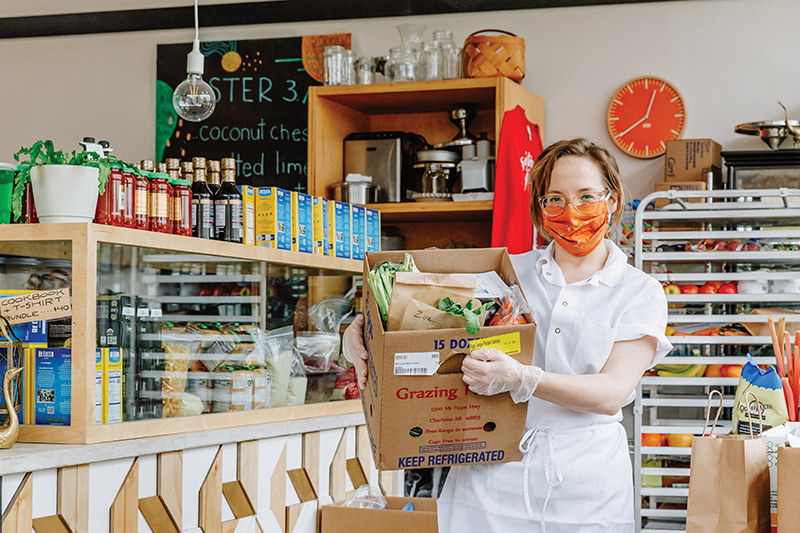
In late February, chef Omar Anani scanned the 30 semifinalists for the James Beard Foundation awards and found that his restaurant, Saffron de Twah, had made the list. Arguably an underdog — the quaint, casual Moroccan-inspired restaurant on Detroit’s east side is a far cry from the glossier downtown-adjacent eateries recognized in years past — Saffron de Twah was included among restaurants helmed by award-winning chefs from Chicago to Santa Monica for the prestigious title of Best New Restaurant. Though the restaurant didn’t advance to the final round, the nod spoke volumes to its excellence. Still, on March 17, in spite of all indications of its early-onset success, Saffron de Twah closed its doors indefinitely, weeks shy of its first anniversary.
The term “pivot” has become a culinary buzzword of late, more common than “plant-based.” Responding to social distancing mandates, traditionally dine-in-only restaurants have offered delivery and curbside service, and developed means of contactless pickups. Though it seemed he put his business on pause, Anani’s core mission to be of service to the restaurant’s surrounding neighborhood became the guiding force behind Saffron de Twah’s purgatorial iteration.
“If I let everyone go, I could have stayed open and done just enough to pay the bills,” Anani says. “But we’re a community-based restaurant. Being closed allows me to do so much more for the community and people in the area than if I was waiting for carryout orders to come in.”
Within days of closing the restaurant, Anani prepared meal kits for displaced food industry workers. He then partnered with Elisa Gurule, a hometown hero coordinating meal deliveries to healthcare workers at Henry Ford Medical Center-Fairlane, a facility that lacks the infrastructure to provide meals to employees. At a hospital without a cafeteria, workers now indulge in warm couscous and comforting congee bowls.
Two-time James Beard Foundation award finalist Lisa Ludwinski’s pivot after announcing the closure of Sister Pie, was similarly motivated by her own mission to serve the community surrounding her West Village pie shop. Her priority was to provide groceries to West Village residents in need. “We identify as a triple-bottom-line business,” a business that equally prioritizes people, profit, and the planet, Ludwinski says. “That’s been helpful for me during a time when I need focus. It helps me make decisions that can positively impact all of those things.”
In late April, Michigan’s COVID-19 death toll was the third-highest in the country. Recognizing the profound impact the virus was having on Detroit, Ludwinski saw an opportunity to leverage her resources and relationships with food vendors in a way that would help locals mitigate their chances of contracting the virus while shopping for essential grocery items. “Just knowing that I have the access to create a space where people can get groceries with no contact, and that’s allowing 20% of my neighbors to truly stay home, to me, feels like a contribution,” she says. “Right now, safety and service and nourishment are things we can provide.”

Standard orders of sugar and flour for the bakery quickly transitioned to purchases of almond milk, pasta, beans, and even packages of toilet paper. Boxes of produce and eggs fill the space, and cooling racks are stacked with grocery orders in place of fresh-baked cookies. “It looks like a totally different place, but for us, it felt like a natural pivot,” Ludwinski says. “This isn’t a financially motivated decision — at this point, we don’t even have a full picture yet of how this is financially impacting us — but there’s a responsibility being a business that can operate essentially and serve the neighborhood.”
Beverage factories became unrecognizable, too. In an effort to meet the persistent demand for hand sanitizer, breweries and distilleries across the state reconfigured their facilities to produce alcohol antiseptics for front-line workers and the general public alike.
At Valentine Distilling Co., gallons of solution rested against whiskey barrels. Alluring, ribbed glass bottles wrapped in a seal labeled Royal Clean replaced the signature bottles of vodka — an entirely new product was born.

By mid-April, Detroit City Distillery had organized deliveries of nearly 8,000 gallons of hand sanitizer to COVID-19 first responders. “We’re trying to prioritize hospitals, healthcare institutions — whether that be nursing homes or youth and homeless shelters — front-line responders, like the police department, fire department, and EMS,” says DCD co-owner Michael Forsyth. “We’re just trying to get it to the folks in the greatest need. I think when you’re called to step up and serve a greater purpose to help the public, you have to do it. That’s the Detroit way.”
Standing in the empty, 20-seat dining room of Saffron de Twah, prepping some 250 meals to be delivered to Henry Ford-Fairlane, Anani notes, “We’re still in the hospitality industry. We have it ingrained in us to give people the shirt off of our backs. We’re going to go out of our way to make sure people are taken care of. We’re just doing it in a different format right now.”
|
|
|













